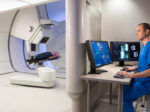Sarcomas are rare cancers that affect connective tissues, including muscles, fat, cartilage, blood vessels (known as soft tissue sarcomas), and bones. While most common in the limbs, sarcomas can occur anywhere in the body. Soft tissue sarcomas are more often diagnosed in the UK than bone sarcomas, though they are rare and account for less than 1% of all cancers.
With sarcomas, early diagnosis can make a significant difference, allowing for treatment before the cancer spreads and with an aim to cure it. If caught early enough, it may be possible to conduct surgery to remove the tumour completely.
Unfortunately, if the sarcoma has spread to nearby lymph nodes, lungs, or bones (a stage referred to as metastatic disease), the treatment plan may be more complex. In this article, we’ll explain how sarcomas are diagnosed and treated, highlight the different options available at each stage, and offer guidance on how to access specialist care and support.
What is the most common type of sarcoma?
There are over 100 subtypes of sarcoma that affect different kinds of connective tissue. The most common type in the UK is soft tissue sarcomas. They form in tissues like fat, muscle, nerves, fibrous tissues, and blood vessels.
Common types of soft tissue sarcoma include:
- Liposarcoma (arising from fat cells)
- Leiomyosarcoma (from smooth muscle)
- Myxofibrosarcoma (from fibrous connective tissues)
Sarcomas remain uncommon, with approximately 4,000 people diagnosed in England each year.
What are the causes of sarcomas?
Sarcomas, like many cancers, are caused by changes to DNA that allow cells to grow in an uncontrolled way. In most cases, no single cause can be identified.
However, certain risk factors are known to increase the likelihood of developing a sarcoma:
- Inherited genetic conditions such as Li-Fraumeni syndrome, neurofibromatosis, and familial retinoblastoma.
- Previous radiation therapy given for another cancer can increase the risk of any type of cancer, including sarcoma.
- Exposure to specific chemicals, such as those used in making plastics, and substances including arsenic, dioxin, and certain herbicides.
- Chronic swelling (lymphoedema) that has lasted for a long time, particularly in the limbs.
- Viral infections, such as human herpesvirus 8, can contribute to the development of Kaposi’s sarcoma.
- Bone diseases can increase the risk of developing certain types of bone sarcomas.
Whatever the reason a sarcoma has developed, the most important thing is to focus on getting the right support and care.
Why sarcomas can be challenging to treat
Both bone and soft tissue sarcoma treatment presents unique challenges, as they are rare, often located in difficult parts of the body, and hard to diagnose. But it’s important to remember that expert help is available.
Sarcomas are rare and diverse
Sarcomas are rare, with hundreds of subtypes, and as a result, it can be challenging to advise a universal treatment plan; therefore, treatment plans need to be tailored to the individual patient. If you have a suspected sarcoma, you will be referred to a specialist sarcoma unit and treated by a multidisciplinary team including clinical nurse specialists, surgeons, oncologists, radiologists and histopathologists. Together, they can create a tailored plan to ensure you receive the best possible treatment.
There are currently 15 specialist sarcoma centres in the UK, with many specialists available at other large hospitals. Specialist private centres like Proton International London also offer treatment for bone and soft tissue sarcomas.
Sarcomas can occur in difficult areas of the body
Soft tissue sarcomas can grow anywhere in the body where there is connective tissue, including near critical organs or structures like nerves, the spinal cord, or major blood vessels. Surgery and other treatments, like radiation, in these areas are naturally more complex and carry additional risks. When this is the case, care is taken to plan each step carefully, drawing on the knowledge of a specialist team to ensure that the approach is as safe and effective as possible.
In some situations, proton beam therapy may be recommended, as its precision can help protect nearby healthy structures while delivering an effective dose to the tumour.
Sarcomas are sometimes difficult to diagnose
Symptoms of sarcoma can be vague or resemble other health conditions, making early detection difficult. A painless lump or swelling may go unnoticed, meaning diagnosis may only come after the cancer has already spread to other organs or tissues. In such cases, the goal of treatment often shifts from curing the cancer to controlling its spread and managing symptoms.
Clinical trials for sarcoma
Clinical trials play a vital role in advancing treatment options for sarcoma. They can involve surgery, chemotherapy, radiation therapy, or newer treatments such as targeted therapies and immunotherapy. However, because sarcomas are rare and highly varied, running clinical trials can be challenging. Fewer patients meet the criteria for each trial, and subtypes behave so differently that it’s difficult to design studies that apply broadly.
Even so, trials are available, and they may provide access to promising new treatments. It is always worth discussing clinical trial options with your specialist doctor.
What are the standard treatment options for a localised sarcoma?
The treatment for soft tissue sarcoma depends on several factors, including tumour type, grade, location, and the patient’s general health. For localised tumours (those that have not spread to other organs or tissues), treatment often includes:
Surgery
Surgical removal of the tumour remains the most common treatment for localised sarcoma. The goal is to remove the cancer cells completely, along with a margin of healthy tissue. This reduces the risk of the tumour returning. Different surgeons may be involved depending on where the tumour is located. For example, orthopaedic surgeons for bone sarcomas, or head and neck surgeons.
Chemotherapy
Chemotherapy is one of the most common ways to treat cancer, using drugs to kill cancer cells and stop them from spreading. For certain sarcomas, chemotherapy may be given before or after surgery. Your multidisciplinary team may decide to offer chemotherapy, depending on the type and grade of the sarcoma, its location, and the extent of its spread. Not all sarcomas require chemotherapy as part of their primary treatment.
For advice on chemotherapy, there are excellent resources on the following websites:
Radiation therapy
Radiation therapy (or radiotherapy) uses high-energy rays to damage or destroy cancer cells. Radiotherapy may be used before surgery to shrink the tumour, or after surgery to target any remaining cancer cells. As with chemotherapy, not every sarcoma patient will need radiation therapy, and decisions are based on each individual case.
Are there new treatments for sarcoma?
Innovation is ongoing in both drug-based and local therapies for sarcoma. For patients with metastatic soft tissue sarcoma or those for whom standard treatments are not suitable, newer options are emerging.
One such advancement is proton beam therapy, a highly targeted form of radiation therapy.
How does proton therapy differ from traditional radiation therapy for sarcoma?
Traditional radiation therapy uses X-rays or photons, which pass through the tumour and continue beyond it. This “exit dose” can expose nearby healthy tissue to radiation, potentially leading to side effects.
Proton beam therapy uses protons instead, which are tiny, positively charged particles found in the centre of every atom. These particles release most of their energy directly at the tumour site and do not travel beyond it. As a result, the surrounding normal tissue is less exposed to the radiation.
This can be particularly beneficial for sarcomas located close to sensitive structures such as the brain, spinal cord, heart, or lungs. In some cases, it also allows for higher radiation doses to be delivered to the tumour itself, which can be important in sarcomas that require strong local control.
Hope and innovation in sarcoma treatment
A sarcoma diagnosis can feel isolating and uncertain, particularly because of how rare these cancers are. But sarcoma treatment has advanced significantly, and experienced teams now offer a range of treatment options tailored to each individual patient.
At Proton International London, our consultant-led team offers private proton beam therapy for sarcomas at our centre, located within University College London Hospital.
If you have been diagnosed with sarcoma, we welcome you to arrange a private consultation to determine whether proton beam therapy is appropriate for you. Our role is to provide expert, balanced guidance, supporting you and your care team in making an informed choice.
To speak to our experienced and caring team, call 020 4629 3598.
Click here to learn more about the types of sarcoma we treat and explore our journal for more insights into cancer care.





